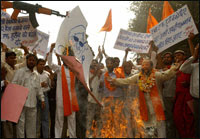
by
May 29, 2007 · Artists in India say they're being subjected to the worst campaign of politically inspired censorship in years.
They say that what they term a "moral police of cultural vigilantes" have targeted art, literature and films. The issue has thrown the focus back to the case of one man, believed by many to be the father of modern Indian art: M.F. Husain.
Some years back, Husain, who's Muslim, painted some works in which Hindu deities were picture in the nude. There was a huge outcry from hardline Hindu activists. They attacked a gallery and destroyed some of his works.
Some people compare M.F. Husain with Picasso, but he disagrees.
"I am an Indian and a painter, that's all," Husain, 92, says.
Husain fails to mention he is perhaps the biggest figure in the artistic life of one of the world's most populous nations.
"If you go out on an Indian street, you will see a splurge of color which is just unparalleled anywhere in the world," says Rajeev Dhavan, an author and advocate in India's Supreme Court. "You take all those colors and put them all in the mind of Husain with an element of structure in them and you see something that is quite magnificent in his range of art."
Visual artist and activist Ram Rahman says Husain represents a new India.
"For many of us he has been a symbol of the new India that came up after Independence," Rahman says. "Secular, modern India. A culture which was shared by all. And he's been remarkable as a contemporary artist because he's one of — actually he's the only artist who has mined our mythological traditions."
You won't find Husain at home. These days he prefers to stay away from India, despite what Dhavan calls "the wishes of his countrymen."
He mostly spreads his time between Dubai and London.
"India reveres Husain," Dhavan says. "It is politically motivated Hindus who have decided to target him as somebody whom they take great exception to in the hope that these terribly cowardly acts that they indulge in will win them support in society and votes when it comes to voting for the right-wing Hindu parties of India."
Not long ago, the activists mobilized again. This time, Husain had done a painting in which a map of India is portrayed as a semi-naked woman – an image assumed to represent the sacred mother India.
The hardliners got a court order to seize Husain's property – although the order was put on hold by the Supreme Court.
Husain supporters point out that in India, there's nothing uncommon about erotic religious images, including naked figures carved in ancient temples.
"And the sad thing is that it's having a terrible impact on our contemporary culture because once you unleash a campaign of hatred as they have done, it gets very hard to pull back from it," Rahman says.
Other artists have been attacked as well.
A protest recently broke out in New Delhi over a student-produced image of the Hindu Deity Kali wielding weapons and giving birth.
Art professor Parul Dave Mukherjee says the student's work hadn't yet gone on public display.
The debate over the boundaries of free speech in India goes beyond paintings. It's also about the rise in raunchy Western-style material in India's media. Even the smallest incident can trigger outrage, as Richard Gere found out when he publicly kissed the actress Shilpa Shetty.
"We always try to cover our own bodies and at least our Mother Goddess. We always try to have the best of images of our Mother Goddess not naked images," says Ashwini Mahajan of the radical Hindu VHP group.
At 92, Husain still paints for five hours a day. His works sell for millions.
"Mostly people are ignorant, what is the language of painting. You know, they're ignorant. It is so difficult to make them aware, but time will teach them," he says.
Many say it will be important to the future of artists for Husain to return to his native India.
"For the artist community here Husain, if he dies outside our country, it's a shame that we will never overcome," Rahman says.


No comments:
Post a Comment